Reviewers & Critics: Roxane Gay

The second installment of Reviewers & Critics features longtime book critic and culture essayist Roxane Gay, a true powerhouse in literary circles.
Jump to navigation Skip to content
Articles from Poet & Writers Magazine include material from the print edition plus exclusive online-only material.

The second installment of Reviewers & Critics features longtime book critic and culture essayist Roxane Gay, a true powerhouse in literary circles.

Melissa Febos, Jay Baron Nicorvo, and nine other authors share their stories of the major turning points they experienced.
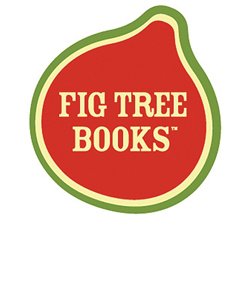
Small Press Points highlights the innovation and can-do spirit of independent presses. This issue features the Bedford, New York–based Fig Tree Books, which seeks to support the voices of American Jewish authors, publishing both new titles and rereleases of out-of-print works.

In Ordinary Light, Pulitzer Prize–winning poet Tracy K. Smith embraces a fuller sense of herself as a writer while cementing the connection between her children and her ancestors using the best glue she knows: words.
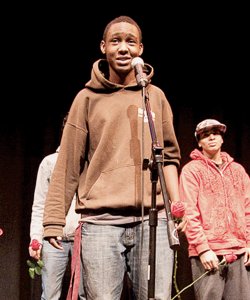
The increasing success and growth of a nonprofit writing center in Portland, Maine, reflects the incredible importance of storytelling in the lives of youths.
Literary MagNet chronicles the start-ups and closures, successes and failures, anniversaries and accolades, changes of editorship and special issues—in short, the news and trends—of literary magazines in America. This issue’s MagNet features Zoetrope: All-Story, Tweed’s Magazine of Literature & Art, the Normal School, Caketrain, and Irish Pages.
With so many good books being published every month, some literary titles worth exploring can get lost in the stacks. Page One offers the first lines of a dozen recently released books, including Kazuo Ishiguro’s The Buried Giant and Reif Larsen’s I Am Radar, as the starting point for a closer look at these new and noteworthy titles.
In the LGBTQ Writers in Schools program’s first district-wide partnership, Lambda Literary teams up with the second largest school district in California to bring LGBTQ books and authors to students.

The director of Bread Loaf’s new Translators’ Conferences talks about how the conference came about, what shape it will take, and what it means to be a translator in today’s literary culture.

Kundiman, the New York City–based organization that hosts a prestigious annual retreat for Asian American poets, celebrates its ten-year anniversary by launching its inaugural fiction retreat this spring.

UK artist Jennifer Collier uses repurposed books and papers to sculpt an array of art objects inspired by the very materials used to create them—from stilettos made from the pages of Little Women to gloves fashioned from the illustrated text of Alice in Wonderland—each finished project a reflection of the written words from which it’s made.

A personal and in-depth look at the life and poetry of John Berryman, with particular focus on The Dream Songs.
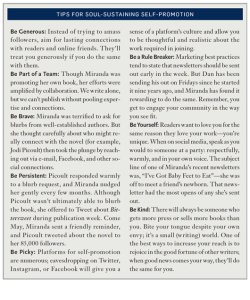
Through blogging, social media, newsletters, and book giveaways, a novelist teams up with the founder of WeGrowMedia to market her book—and show how making a personal connection with readers can go a long way towards making a book a best-seller.

In the inaugural installment of our new feature, Reviewers & Critics, New York Times book reviewer Dwight Garner talks about his experience as a critic—the required credentials (or lack thereof), how to cut through the hype, the role of negative reviews, and more.
Since appearing in our annual Debut Poets roundup, a number of the one hundred and twelve poets we’ve highlighted have gone on to create a wealth of interesting and important work. The following list includes each poet we’ve featured in the past ten years, his or her debut collection, and the many full-length books that followed.
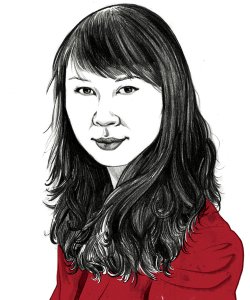
In our tenth annual look at debut poets, we’ve asked the more than one hundred poets previously included in this feature to nominate their favorite debut collections of 2014. From that longlist of outstanding work, we’ve selected ten poets to feature here, who share their inspirations and influences, how their books began, and advice to those hoping to get their own books out into the world.

Innovations like the USB Typewriter, Hanx Writer, Hemingwrite, and Typing Writer are giving new life to the classic typewriter by updating it for the digital world.
With help from the Lannan Foundation, one of America’s most prestigious poetry prizes has survived the threat of shutting its doors, instead increasing its monetary award tenfold.
With so many good books being published every month, some literary titles worth exploring can get lost in the stacks. Page One offers the first lines of a dozen recently released books, including Edith Pearlman’s Honeydew and Rikki Ducornet’s The Deep Zoo, as the starting point for a closer look at these new and noteworthy titles.
Literary MagNet chronicles the start-ups and closures, successes and failures, anniversaries and accolades, changes of editorship and special issues—in short, the news and trends—of literary magazines in America. This issue’s MagNet features Ninth Letter, Gulf Coast, Gigantic, and Parallax.

Small Press Points highlights the innovation and can-do spirit of independent presses. This issue features the San Francisco–based Manic D Press, which publishes a broad array of books by authors who would otherwise be, as editor Jennifer Joseph says, “shunned by the traditional publishing establishment for their lack of commercial viability.”
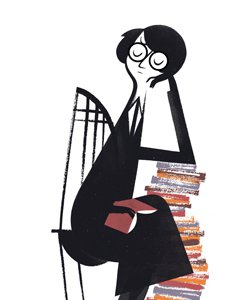
“My work is a lifelong celebration of futility.” Artist Roman Muradov, designer of this issue’s cover, discusses his various wells of inspiration, his relationship to the written word, and the importance of doing nothing.
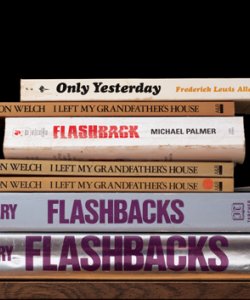
In her Sorted Books project, Nina Katchadourian arranges books from libraries—including William S. Burroughs’s personal collection, as well as those housed in museums and galleries across the country, to find a kind of poetry in the spines.
Amidst questions of racial diversity in the publishing industry, the Hurston/Wright foundation continues its outstanding support of African American writers, promising a brighter outlook for the state of writing in America.
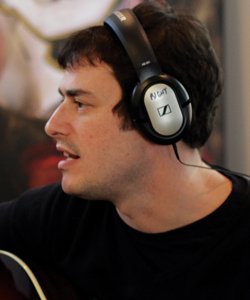
A songwriter responds to literature—such as stories by Jonathan Lethem and George Saunders—with music, carrying the creative conversation across art forms.